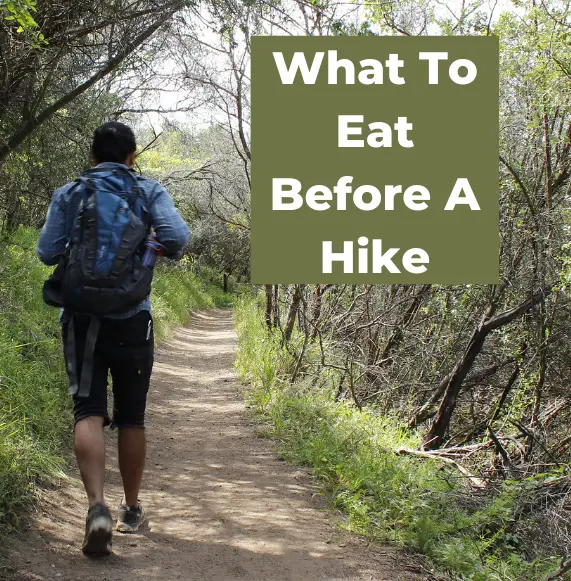Hiking is a great way to get outside and enjoy the great outdoors while getting some exercise. However, it’s important to know what to eat before hiking to ensure that you have enough energy to complete your hike. Eating the right foods before a hike can help prevent fatigue and keep you feeling strong throughout your adventure.
When planning your pre-hike meal, it’s important to focus on foods that are high in carbohydrates, as they provide the body with the energy it needs to power through physical activity. Lean meats like chicken or fish can provide a good source of protein to help build and repair muscles. It’s also important to drink plenty of water before hitting the trails to stay hydrated.
We’ll go over everything you need to know to properly fuel your body before hiking in today’s guide.
Is It Better to Eat Before or After a Hike?

When it comes to eating before or after a hike, there are different opinions. Some hikers prefer to eat before a hike to store up energy while others prefer to eat after a hike to replenish lost nutrients. So, is it better to eat before or after a hike? The answer is that it depends on the individual’s preferences, the length and intensity of the hike, and the timing of the meal.
Pros of Eating Before a Hike
Eating before a hike can help hikers store up energy and maintain their endurance during the hike. It can also help prevent hunger and fatigue during the hike, which can be distracting and uncomfortable. Eating a balanced meal with complex carbohydrates, protein, and healthy fats a few hours before the hike can provide the body with the necessary nutrients and energy to perform well.
Pros of Eating After a Hike
Eating after a hike can help hikers replenish lost nutrients and promote muscle recovery. It can also help prevent dehydration and fatigue after the hike. Eating a balanced meal with protein, complex carbohydrates, and healthy fats within an hour of completing the hike can help the body recover and rebuild muscle tissue.
Factors to Consider
When deciding whether to eat before or after a hike, hikers should consider the length and intensity of the hike, the timing of the meal, and their personal preferences. For shorter and less intense hikes, hikers may not need to eat before or after the hike. For longer and more intense hikes, hikers may benefit from eating both before and after the hike.
What to Eat Before or After a Hike
Hikers should aim to eat a balanced meal with complex carbohydrates, protein, and healthy fats before and after the hike. Some good pre-hike meal options include oatmeal with fruit, whole-grain bread with peanut butter, or Greek yogurt with nuts and seeds. Some good post-hike meal options include grilled chicken with vegetables, quinoa salad with avocado, or salmon with sweet potato.
Is It Okay to Hike on an Empty Stomach?
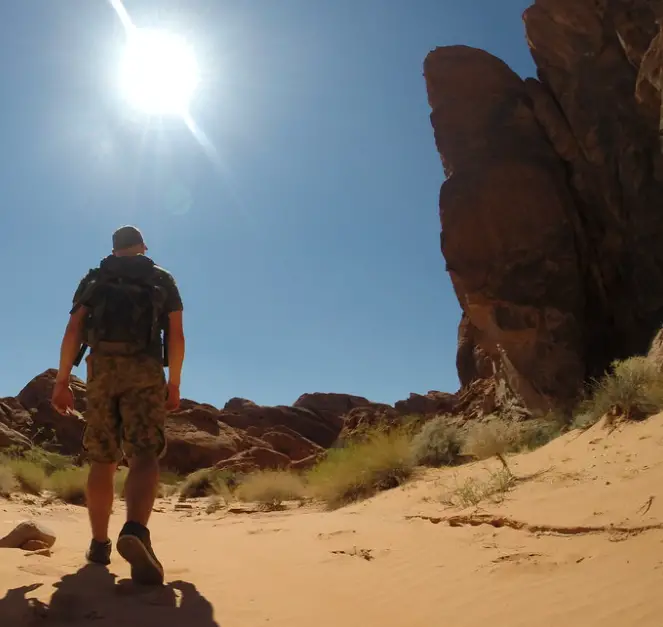
Many hikers wonder whether they hike without eating beforehand. Some people think that hiking on an empty stomach can help them burn more calories and lose weight faster, but experts recommend having a proper meal before hiking to prevent fatigue, dehydration, and other health issues.
When you hike, your body needs energy to keep going. If you don’t eat anything, your blood sugar levels will drop, which can lead to dizziness, weakness, and even fainting. Moreover, hiking on an empty stomach can cause muscle breakdown, as your body may start using protein for fuel instead of carbohydrates.
It’s best to eat a meal or snack containing carbohydrates, protein, and healthy fats at least one hour before hiking. This will give your body enough time to digest the food and convert it into energy. You can also have a small snack, such as a banana, a granola bar, or a handful of nuts, 30 minutes before hiking to top up your energy levels.
Here are some of the risks of hiking on an empty stomach:
| Risk | Explanation |
| Fatigue | Without enough glucose in your bloodstream, your muscles won’t have enough energy to keep going. |
| Dehydration | Your body needs water to digest food and regulate temperature. If you don’t drink enough fluids, you may become dehydrated, which can cause headaches, dizziness, and muscle cramps. |
| Low Blood Sugar | When you don’t eat anything, your blood sugar levels drop, which can lead to fatigue, weakness, and irritability. |
| Muscle Breakdown | If your body doesn’t have enough carbohydrates to burn, it may start using protein from your muscles, which can lead to muscle breakdown and weakness. |
To put it simply, it’s not recommended to hike on an empty stomach. Eating a balanced meal or snack before hiking can provide your body with the energy and nutrients it needs to perform at its best. Make sure to drink plenty of water, too, to stay hydrated and prevent cramps and fatigue.
Benefits of Eating Before Hiking
Eating before hiking provides numerous benefits that can help make the hike more enjoyable and successful. Here are some of the benefits of eating before hiking:
Provides Energy
Eating before hiking provides the body with the necessary energy to complete the hike. The body needs glucose for energy, and glucose comes from the food that is eaten. Eating a meal that is high in carbohydrates provides the body with a quick source of energy that can be used during the hike.
Prevents Hunger
Eating before hiking can help prevent hunger during the hike. Hunger can be distracting and can make it difficult to focus on the hike. Eating a meal that is high in protein and fiber can help keep the stomach full and prevent hunger.
Improves Endurance
Eating before hiking can improve endurance by providing the body with the necessary nutrients to keep going. Eating a meal that is high in carbohydrates and protein can help improve endurance and keep the body going for longer periods of time.
Hydration
Eating before hiking can also help with hydration. Eating foods that are high in water content, such as fruits and vegetables, can help keep the body hydrated during the hike.
Prevents Cramping
Eating before hiking can help prevent cramping. Eating foods that are high in potassium, such as bananas, can help prevent cramping during the hike.
What Should I Eat the Night Before a Hike?
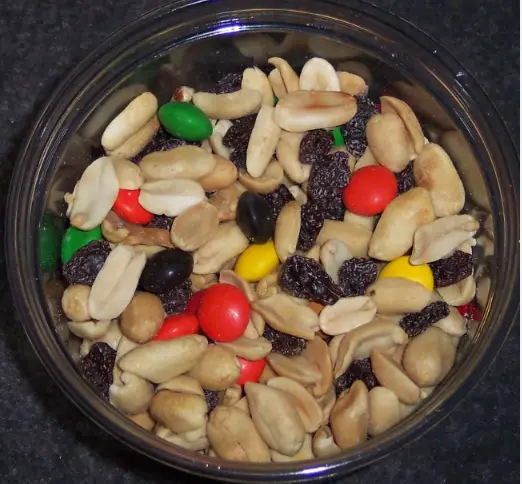
When preparing for a hike, it’s essential to fuel your body with the right foods. What you eat the night before can have a significant impact on your energy levels during the hike. Here are some tips on what to eat the night before a hike:
Complex Carbohydrates
Complex carbohydrates are an essential part of a hiker’s diet. They provide long-lasting energy and are slowly digested by the body. Some examples of complex carbohydrates include sweet potatoes, whole grain pasta, rice, and beans.
Lean Protein
In addition to carbohydrates, it’s also important to consume lean protein the night before a hike. Lean protein helps repair and build muscle tissue, which can help prevent injury during the hike. Some examples of lean protein include chicken, turkey, fish, tofu, and legumes.
Hydration
Staying hydrated is crucial for hikers. The night before a hike, it’s important to drink plenty of water to ensure that your body is properly hydrated. Avoid sugary drinks and alcohol, as they can dehydrate the body and lead to a lack of energy during the hike.
Snacks
It’s a good idea to pack some snacks for the hike the night before. Some great options include energy bars, trail mix, and fruit. These snacks provide quick energy and can help keep you going during the hike.
Overall, the night before a hike, it’s important to consume a balanced meal that includes complex carbohydrates, lean protein, and plenty of water. By fueling your body with the right foods, you’ll be able to tackle the hike with energy and stamina.
What Should I Eat the Morning of a Hike?
When planning a hiking trip, it’s important to consider what you’ll eat before you hit the trails. Eating the right foods will give you the energy you need to power through your hike and ensure that you don’t get hungry or fatigued along the way.
When To Eat Before Hiking
It’s recommended to eat a meal about two to three hours before you start hiking. This will give your body enough time to digest the food and convert it into energy. Eating too close to your hike can cause stomach discomfort or cramps, while eating too far in advance can leave you feeling hungry during your hike.
What to Eat
For a morning hike, it’s important to eat a meal that is high in complex carbohydrates, which will provide you with long-lasting energy. Some good options include:
- Oatmeal with fruit and nuts
- Whole-grain toast with peanut butter and banana
- Greek yogurt with granola and berries
- Scrambled eggs with whole-grain toast and avocado
It’s also important to stay hydrated before and during your hike. Drinking water or electrolyte-rich beverages like coconut water or sports drinks can help you replenish fluids lost through sweat.
Avoid eating foods that are high in fat or protein, as they take longer to digest and can leave you feeling weighed down. It’s also a good idea to avoid sugary foods, as they can cause a quick spike in energy followed by a crash.
Overall, a balanced meal with complex carbohydrates, protein, and healthy fats will give you the energy you need for a successful hike. Don’t forget to stay hydrated and listen to your body’s hunger cues throughout your hike.
What NOT To Eat Before a Hike
When planning a hike, it’s just as important to know what not to eat before a hike. Eating the wrong foods can lead to digestive issues, lack of energy, and even injury. Here are some foods to avoid before a hike:
High-Fat Foods
High-fat foods such as fried foods, fatty meats, and heavy cream-based sauces should be avoided before a hike. These foods take longer to digest and can leave you feeling sluggish and lethargic. They can also cause stomach discomfort and cramping during the hike.
Sugary Foods
Sugary foods such as candy, soda, and pastries should also be avoided before a hike. While they may provide a quick energy boost, this energy is short-lived and can lead to a crash later on. Additionally, sugary foods can cause a spike in blood sugar levels, leading to feelings of fatigue and weakness.
Spicy Foods
Spicy foods such as hot sauce, chili peppers, and spicy curries can cause digestive issues during a hike. These foods can irritate the digestive system and cause discomfort, bloating, and gas. It’s best to avoid these foods before a hike to prevent any digestive issues.
Alcohol
Alcohol should be avoided before a hike. It can cause dehydration, which can lead to fatigue and muscle cramps. Additionally, alcohol can impair judgment and coordination, increasing the risk of injury on the trail. It’s important to stay hydrated with water or sports drinks before a hike.
Caffeine
While caffeine can provide a quick energy boost, it can also cause dehydration and jitters. It’s best to avoid caffeine before a hike, or limit intake to a small amount in the morning. Opt for water or sports drinks instead to stay hydrated during the hike.
What Should You Eat During A Hike?
When it comes to hiking, it’s essential to keep your energy levels up by eating the right foods. Snacking throughout the hike is equally important, especially if you take on longer day hikes or multiple-day hikes. Here are some food ideas to consider during a hike:
Trail Mix
Trail mix is an excellent option for a quick and easy snack during a hike. It’s lightweight, easy to pack, and provides a good mix of carbohydrates, protein, and healthy fats. You can make your own trail mix by combining nuts, seeds, dried fruit, and chocolate chips.
Energy Bars
Energy bars are another great option for a quick and easy snack during a hike. They are packed with carbohydrates, protein, and healthy fats, making them an excellent source of energy. Look for bars that are low in sugar and high in fiber.
Fresh Fruits
Fresh fruits like apples, bananas, and oranges are easy to pack and provide a quick source of energy. They are also packed with nutrients, vitamins, and minerals that are essential for maintaining good health.
Jerky
Beef, turkey, and chicken jerky are excellent sources of protein and are easy to pack. They are also lightweight and provide a good source of energy during a hike.
Electrolyte Drinks
Electrolyte drinks like Gatorade, Powerade, Body Armor, or Prime are essential for maintaining hydration and electrolyte balance during a hike. They help replace the electrolytes lost through sweat and provide a quick source of energy.
What To Eat After a Hike
After a long hike, the body needs to replenish the nutrients and energy it has lost. Eating the right foods after a hike can help the body recover faster and reduce muscle soreness. Here are some recommendations on what to eat after a hike:
High-Protein Foods
High-protein foods are essential for muscle recovery and growth. After a hike, the body needs protein to repair the muscle tissues that have been damaged during the hike. Some good sources of protein include:
- Chicken or turkey breast
- Lean beef or pork
- Fish, such as salmon or tuna
- Eggs
- Low-fat dairy products, such as Greek yogurt or cottage cheese
- Legumes, such as lentils or chickpeas
Carbohydrates
Carbohydrates are important for replenishing the glycogen stores in the muscles and liver. Glycogen is the primary source of energy for the body during exercise. Some good sources of carbohydrates include:
- Brown rice
- Whole-grain bread or pasta
- Sweet potatoes
- Quinoa
- Fruits, such as bananas, apples, or berries
- Vegetables, such as broccoli, carrots, or spinach
Hydration
Proper hydration is crucial after a hike. Drinking water helps the body recover faster and prevents dehydration. It is recommended to drink at least 16 ounces of water for every pound of body weight lost during the hike. In addition to water, sports drinks can be beneficial for replenishing electrolytes lost during the hike.
Snacks
Snacking after a hike can help the body recover faster and reduce hunger cravings. Some good post-hike snacks include:
- Trail mix with nuts and dried fruits
- Protein bars or shakes
- Fresh fruits, such as apples or oranges
- Hummus with vegetables or pita chips
- Cheese and crackers
Overall, eating a balanced meal with a combination of protein, carbohydrates, and healthy fats can help the body recover faster after a hike. It is also essential to drink plenty of water and replenish electrolytes lost during the hike.
The Top Hiking Foods For Complex Carbs and Lean Protein
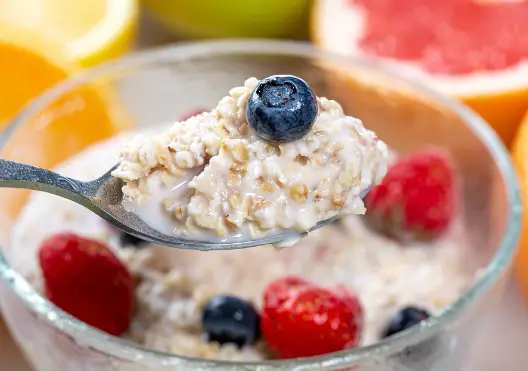
Before hitting the trails, it is essential to fuel your body with the right nutrients. Complex carbs and lean protein are two vital components of a pre-hike meal that can provide sustained energy and help build and repair muscles.
Oatmeal: A Great Source Of Energy
Oatmeal is a classic breakfast food that is rich in complex carbs and fiber. It is a slow-digesting food that can provide sustained energy for hiking. Oats are also a good source of vitamins and minerals such as iron and magnesium. For a delicious and nutritious pre-hike meal, try making a bowl of oatmeal with your favorite toppings such as fruits, nuts, or honey.
Eggs: A Great Source Of Protein
Eggs are a fantastic source of high-quality protein that can help build and repair muscles. They are also rich in essential amino acids, vitamins, and minerals such as vitamin D and choline. Scrambled eggs or an omelet with vegetables can make for a quick and easy pre-hike meal.
Nut Butter: Bone Health and Muscle Strength
Nut butter such as peanut butter or almond butter is a rich source of healthy fats, protein, and fiber. They are also a good source of magnesium, which is essential for bone health and muscle strength. Spread nut butter on whole-grain toast or add it to your oatmeal for a delicious and nutritious pre-hike meal.
Lean Meat: An Excellent Source Of Protein
Lean meats such as chicken, turkey, or fish are excellent sources of protein that can help build and repair muscles. They are also rich in essential amino acids, vitamins, and minerals such as iron and zinc. Grilled chicken or fish with vegetables can make for a tasty and nutritious pre-hike meal.
Pasta: Great Carb Source
Pasta is a popular pre-hike meal option that is rich in complex carbs and can provide sustained energy for hiking. It is also a good source of fiber and essential nutrients such as vitamins and minerals. Whole-grain pasta with vegetables and a lean protein source such as chicken or tofu can make for a delicious and nutritious pre-hike meal.
Hiking Hydration
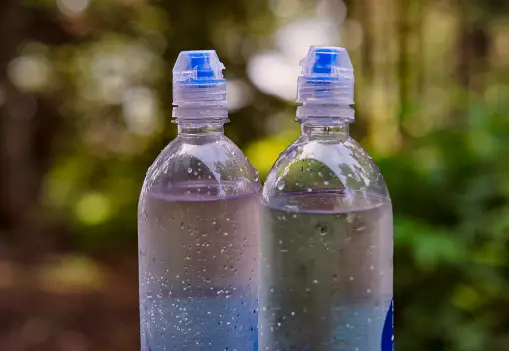
Staying hydrated is essential for a successful hike. Water is the most important thing to bring on a hike, and a good rule of thumb is to drink half a liter of water per hour of hiking. It’s also important to start hydrating well before the hike begins.
In addition to water, electrolyte drinks can be helpful for longer hikes or hikes in hot weather. These drinks can help replace the sodium, potassium, and other minerals lost through sweat. However, it’s important to read the labels carefully, as some electrolyte drinks can be high in sugar or caffeine.
Make sure you’ve got a good way to carry water while hiking and that you can carry enough to last you the duration of your hike.
Another way to stay hydrated is to eat hydrating foods. Fruits and vegetables, such as watermelon, cucumbers, and oranges, are high in water content and can help keep you hydrated.
It’s also important to avoid alcohol and caffeine before a hike, as they can dehydrate the body. Instead, opt for water or sports drinks.
For longer hikes, it may be necessary to bring a water filter or purification tablets to ensure a safe water source. It’s important to research the area beforehand to determine the availability of water sources and plan accordingly.
Overall, staying hydrated is crucial for a successful and safe hike. Bringing enough water, electrolyte drinks, and hydrating foods, and avoiding alcohol and caffeine, can help ensure a comfortable and enjoyable hiking experience.
| Hydration Tips |
| Drink half a liter of water per hour of hiking |
| Start hydrating well before the hike begins |
| Read labels carefully when choosing electrolyte drinks |
| Eat hydrating foods like watermelon, cucumbers, and oranges |
| Avoid alcohol and caffeine before a hike |
| Bring a water filter or purification tablets for longer hikes |
| Research the availability of water sources beforehand |
Check out our other helpful hiking guides while you’re here:

